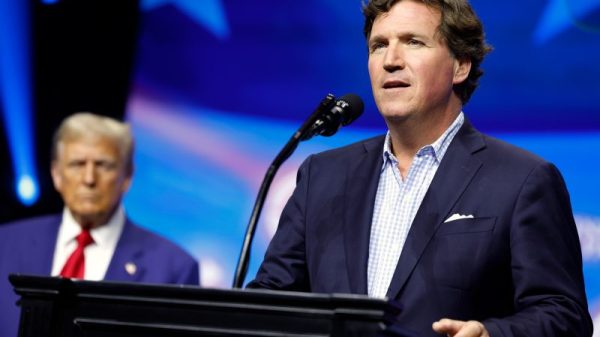One of the most fundamental principles in American sports — Saturdays in the fall are for college football, while Sundays are for the NFL — did not happen by accident.
In fact it was written into a bill passed by Congress and signed by President Kennedy in 1961. The primary purpose of the law was to grant professional sports leagues an antitrust exemption for negotiating television rights collectively and distributing the money equally, which was no small feat during an era when anything that hinted at communism was bad politics.
A key part of the deal was that the NFL would lose antitrust protections if it broadcast any games from 6 p.m. on Friday nights until Sunday that were being played within 75 miles of a high school or college game. In effect, that meant Saturday was legally protected as college football’s day.
But 63 years on, there’s a catch: Restrictions on the NFL are only valid through the second Saturday in December. Back then, that made a lot of sense because the college season was already over, save for the New Year’s bowl games.
These days, though — and especially this year — it has put college and the NFL into direct competition. And the result of that conflict will undoubtedly suck up a lot of attention next week as we analyze the first set of games from the expanded College Football Playoff.
As sports viewers and fans, Saturday is going to be a bonanza unlike anything we’ve ever seen. At noon Eastern, things kick off with SMU at Penn State followed by Clemson at Texas and then the primetime game at 8 p.m. with Tennessee playing at Ohio State in temperatures projected to be in the teens.
It projects to be one of the great days in the history of college football.
ON THE MOVE: Ranking the top quarterbacks in the transfer portal
And it’s also, to some degree, going to be overshadowed by the fact that the Houston Texans and Kansas City Chiefs will be kicking off at some point in the second quarter of the SMU-Penn State game. The Pittsburgh Steelers-Baltimore Ravens clash will mostly be running concurrently with Clemson-Texas.
“Obviously its a big issue, and it was really discussed at length,” recently retired American Athletic Conference commissioner and former sports television executive Mike Aresco told USA TODAY Sports. “No one liked it, believe me.”
Reality check: As amazing and unique as it will be for fans to finally see playoff football in iconic places like Happy Valley and Austin and the Horseshoe, the NFL would be a two-touchdown favorite to win the ratings battle on Saturday.
It’s easy to see why. A year ago, the Week 16 games on Saturday drew 14.3 million viewers on NBC for Pittsburgh-Cincinnati and 7.3 million for Bills-Chargers, which was shown exclusively on Peacock. The NFL matchups this year are even more attractive, as all four teams are likely playoff-bound and both games will be shown on over-the-air networks.
As football fanatics with access to split screens and multiple devices, it’s heaven. But such a stark, one-on-one comparison to King NFL is probably going to highlight the biggest potential issue with the expanded CFP.
By adding more teams, more rounds and extending the season all the way until Jan. 20 for the championship game, college football is trying to grab a piece of real estate the NFL has already claimed. And that presents a whole bunch of existential issues that could shape how the playoff looks in the future as the sport’s leaders try to figure out what works best to put their sport in the spotlight.
“Everybody will be looking closely to see how the ratings look,” Aresco said. “I think at some point it’s just tough to get in there without having that overlap. It’s going to be very interesting. There’s just limited flexibility where you can put these games if you want to maintain (competitive) equity and not have games spread out during the week where someone will have the rest advantage for the next round.”
Had college football embraced a real playoff a couple decades ago when it became clear there was an appetite for something besides the Bowl Championship Series, it might have had a chance to put down roots on these Saturdays in December, even if they aren’t protected by law.
Instead, the NFL has filled that void — and rightfully so. From mid-December on, Saturday is their day. College football, and its partners at ESPN/ABC and TNT, are the ones trying to shave off a piece of their audience. It’s going to be great for college football fans, but the reality is that the games will need to deliver to break through when they’re running up against the most bankable ratings monster in sports.
That’s not easy. Even the NBA, which used to own Christmas Day, has struggled to reproduce its ratings in that time slot since the NFL planted its flag there beginning in 2020.
“They take territory,” Aresco said. “They’re not shy about that.”
The direct conflict college football finds itself in now is a continuation of the unavoidable, but mostly self-inflicted scheduling issues that have plagued the CFP from the beginning.
In the College Football Playoff’s first 10 years, ratings were generally good when the semifinals took place on New Year’s Day and not nearly as good when they’ve been on other days. That was no surprise to anyone, except for the people who created the CFP with expectations that they were going to “change the paradigm of New Year’s Eve in this country” in the words of former director Bill Hancock.
What really happened is that college football learned it doesn’t have the power to shape viewing behavior on that level. In other words, it’s not the NFL.
With bowl and television contracts expiring in 2026, the playoff will have more flexibility and power to demand that its quarterfinal games primarily take place on Jan. 1. This year will feature a New Year’s Day triple header with one game kicking off at 7:30 p.m. on New Year’s Eve. That’s more traditional territory where college football can dominate.
But the semifinals this year will be on Jan. 9 and 10 — a Thursday and Friday night. Why? Because playing the games on Saturday would mean an incursion into the NFL’s wild card weekend. And when the CFP concludes on Jan. 20, it will be the day after the NFL’s conference championship matchups are set.
This is a problem that may not have a solution. It may not even be a problem at all. Regardless of which product you prefer, college football should never have to apologize for not being as popular or matching the NFL’s TV ratings, and unless you’re an executive at ABC/ESPN, it’s unclear why you should care.
We live in a culture, though, that frames these metrics almost like a Rorschach test. If you are inclined to watch the NBA most nights and believe that the crop of players are the most talented overall that the league has ever seen, you’re likely to dismiss or excuse the recent headline that ESPN’s ratings were down 28% through the first 18 games broadcast this year on the network. If you’re inclined to dislike the NBA, it’s a told-you-so opportunity to blame the style of play, wokeism or the prevalence of non-American stars.
If college football gets crushed in this weekend’s ratings wars, it won’t mean that expanding the CFP was a mistake or that the selection committee picked the wrong teams.
It will mean leaders of the enterprise need to put a lot of care and thought into the best way they can optimize the playoff while trying to avoid the appearance of being a second-class citizen.
It won’t be easy. In the first 10 years of the CFP, it was a challenge to stay in the headlines for those 10 days or so between the semifinals and championship game. That only gets more difficult once you push the season further and further into a month typically dominated by the NFL playoffs.
In an ideal world, college football would end on New Year’s Day like it did for decades. But unless conference commissioners are willing to shorten the regular season (no chance), move the season’s start date a couple weeks earlier (highly unlikely) or eliminate conference championship games (tough sell), the CFP is going to spend most of its time fighting for oxygen with the NFL’s crescendo toward the Super Bowl.
That’s a tough, tough battle. And after this weekend, we’re going to get the first data set on whether college football is going to pay a price.




























